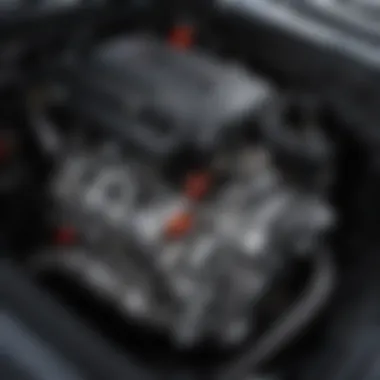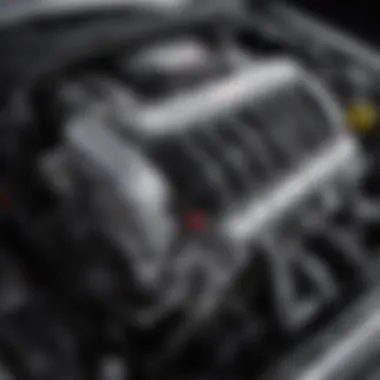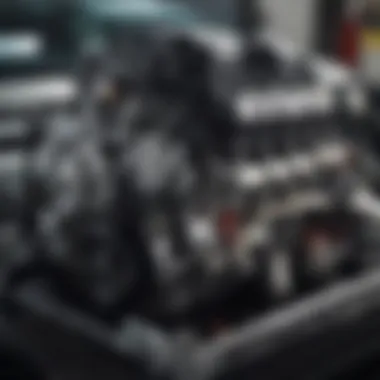Exploring the 2003 Honda Civic EX Coupe Engine Specs & Performance


Intro
The 2003 Honda Civic EX Coupe epitomizes a blend of reliability, efficiency, and spirited performance. Understanding its engine is essential for automotive enthusiasts and prospective buyers alike. The compact coupe market is competitive, and placing the Civic EX in the right context can reveal what makes it a preferred choice among many.
This article aims to offer an in-depth walkthrough of the 2003 Honda Civic EX Coupe's engine, covering its specifications, performance metrics, and distinctive features. This exploration engages not only in the mechanical aspects but also touches on practical concerns like maintenance needs and ownership experiences. By the end, readers will gain valuable information, allowing for informed decisions whether in terms of purchasing or maintenance.
In-Depth Vehicle Reviews
Overview of the Vehicle
The 2003 Honda Civic EX Coupe dpes not merely aim for the ordinary. Its design embodies sportiness with compact dimensions. The exterior stands out with sleek lines and a modern aesthetic. Inside, ergonomics prioritize driver comfort and intuitiveness. The vehicle houses ample storage for a day-to-day compact. These features, combined with Honda's respected reputation, make it an appealing option for drivers seeking fun in compact form.
Key Specifications
Under the hood, the Civic EX Coupe is powered by a 1.7L inline-4 engine that delivers 127 horsepower and 114 lb-ft of torque. This engine not only ensures adequate power for everyday driving, but also sits on a lightweight architecture, enhancing responsiveness and efficiency. Optimistic characteristics do include a 5-speed automatic transmission, enhancing the driving experience.
Performance Analysis
Performance metrics now can be revealing. The Civic's engine achieves 0-60 mph in under 9 seconds, providing a spirited yet safe ride for daily users. Its acceleration wa දmked by accessible handling at all speeds. An impressive turning radius adds to ease for urban dwellers.
▶️ Key Performance Points:
- Engine: 1.7L Inline-4
- Power Output: 127 hp
- 0-60 mph: ~8.9 sec
Safety Features
Safety remains a cornerstone of Honda's philosophy. The Civic EX Coupe is equipped with dual front airbags and anti-lock braking system (ABS). Moreover, the handling improvements contribute to avoidance maneuvers during sudden situations. Checking into government safety ratings offers valuable insights as well.
Technology and Infotainment
The tech aspect flaunts features that were quite auspicious for its time. A 6-speaker sound system delivers clear audio cues, inputting both CD and radio capabilities but devoid of the complexity found in modern cars. Optional upgrades like navigation systems exist but are limited for you now.
Fuel Efficiency and Sustainability
Not much can be said about reprapping chambers inline for sustainability agreements. The Civic 2003 aims for impressive efficiency at around 29 mpg in the city and 38 mpg on the highway. Reviewersit often finds the balance impressive considering competitors around the same time.
Market Trends and Insights
Current Automotive Trends
The discussion today often pivots toward a market characterized by rising electrification and adventurous designs. While the trends of yore riased elsewhere advertisements, the Civic sill gears toward usability above all. Cruising emerges back and analysis reveals consumer focus remains critical toward fuel efficiency.
Emerging Technologies
One can discuss how onboard tech evolved yet some fundamentals remained. Bluetooth functionality and smartphone pairability gained traction after this model year. Lesser can d can prove itsstr239 usability stand in era's edge.
Maintenance and Ownership Costs
Overview of Regular Maintenance Needs
Long-term ownership eventually focuses mind to heading beyond standard items. The Civic’s simpler engineering exemplifies lower upkeep needs. Most template needs revolve around oil changes, routine checks on brakes and tires. The changes facilitate problem identification.
Tips for Reducing Maintenance Expenses
Staying on preventive side not only prolongs life, but also counters costs effectively. Consider maintaining intervals based per manual.
Real Owner Experiences and Cost Experiences
Challenging repairs rarely visit if seasons run trochey gentle to grants received check over the mess. Seeing forums reveals civic owners appreciative of cost benefits during lifetimeHive every reconvene..


Preface to the Honda Civic EX Coupe
The 2003 Honda Civic EX Coupe holds a relevant place in the compact car market. With its dependable engineering and solid performance, it supports a reputation for livability. Car enthusiasts and potential buyers alike find interest in how the Honda Civic lineup reflects changing consumer needs. Understanding the advantages and features of the 2003 model can aid informed choices. This section carefully explores the foundations of the Civic model's evolution and its strategic place during the early 2000s.
Overview of the Honda Civic Lineup
Since its inception in 1972, the Honda Civic has undergone significant evolution. Each generation brings diverse models catering to a variety of preferences. Throughout its development, the Honda Civic has consistently combined style, efficiency, and performance. Notable enimties include the reliability and affordability that typically interest buyers.
In the 2003 lineup, several options appeal variously to the audience. These include sedans, coupes, and hatchbacks, each tailored to meet different demands. The Civic's practicality and agility create a strong narrative for any buyer looking for commuter utilities. Furthermore, the ability to customize adds to the Civic's charm.
Considering the 2003 Civic EX Coupe, it stands out with its sporty aesthetic combined with practical functionalities. This model captures the essence of the compact coupe while presenting an inviting performance for everyday driving.
Positioning of the Model
Positioning of the 2003 Honda Civic EX Coupe results from comprehensive market research. Honda identified youth and first-time car buyers as key target audiences. The model is designed to balance attractiveness alongside practical features, offering excellent fuel efficiency and a solid driving experience.
The 2003 model embodies a midpoint between economy and sportiness. With a focus on performance, the Civic EX Coupe integrates fun driving dynamics while maintaining everyday-relevance. Compared to competitors like the Toyota Corolla and Nissan Sentra, this model shines in distinct areas.
Its exterior design attracts attention, with a more aggressive look compared to its predecessors. Inside, space maximization means comfort while engaging drivers. Overall, this model successfully bridges style with functionality, ensuring relevancy in various automobile segments.
Engine Specifications
Understanding the engine specifications of the 2003 Honda Civic EX Coupe is crucial for anyone seeking to gauge the overall performance and efficiency of this vehicle. Details about the engine can offer insights into its mechanical design, along with its capabilities and limitations. Clarifying these specifications ensures potential buyers and automotive enthusiasts appreciate what this model contains under the hood, impacting decisions regarding purchase, usage, and aftermarket modifications.
Type of Engine
The 2003 Honda Civic EX Coupe features a 1.7-liter inline-4 engine, known for its durability and energy efficiency. This engine, part of Honda's popular D series, is recognized for a balance of quality and practical performance. Honda has a reputation for building reliable engines, and this model supports that claim. The specific design facilitates smooth operating conditions, making it suitable for varied driving environments. Inline-four engines, being generally lighter, contribute to better handling and maneuverability in tight spaces, such as urban driving.
Displacement and Configuration
The 1.7-liter displacement is a vital measure as it directly influences both power and fuel efficiency. With a DOHC (Double Overhead Camshaft) design, the engine effectively maximizes airflow, leading to better combustion control and improved performance. The configuration supports deeper and quicker acceleration while managing reasonably efficient fuel consumption.
The displacement is also helpful for potential modifications. Car enthusiasts may consider performance enhancements, knowing the base specification is manageable and straightforward.
Power Output and Torque
In terms of power output, the 2003 Honda Civic EX Coupe engine generates approximately 127 horsepower at 6,600 RPM, along with a torque of 114 lb-ft at 4,300 RPM. These numbers establish a definitive understanding of what drivers can expect in real world conditions, ensuring balance between acceleration and efficiency.
One must note that while these figures might seem modest by today's standards, they were competitive for compact cars during that era. Furthermore, a higher torque at relatively lower RPMs allows for improved drivability in everyday conditions. The engine is intended to balance sporty feelings with practicality, showcasing Honda's strategic approach to engine design.
Proper understanding of engine specifications remains key to effective decision making in car ownership and upgrades.
Overall, the power characteristics will satisfy common driving needs, especially for first-time buyers and those who prefer a car suited for city travel and light road trips. The unique interplay between power output and torque matches both casual driving requirements and reliability expectations from a vehicle in this segment.
Performance Analysis
When evaluating the 2003 Honda Civic EX Coupe, one must carefully consider its performance analysis. This section plays a crucial role in understanding how the vehicle behaves on the road and contributes to the overall driving experience. Performance metrics such as acceleration, fuel economy, and driving feel directly impact both owner satisfaction and practicality.
Acceleration and Speed
The acceleration of the 2003 Honda Civic EX Coupe is a quintessential aspect for any car enthusiast or potential buyer. Powered by a 1.7-liter inline-four engine, this model achieves 0 to 60 mph in approximately 7.9 seconds. While this figure may not set speed records, it reflects an agile responsiveness suited for urban environments and occasional highway merges.
The vehicle's design, along with its curb weight, significantly influences its speed capabilities. The efficient CVT (Continuously Variable Transmission) allows seamless shifting, promoting an enhanced drive. Acceleration is smooth, and the vehicle feels remarkably composed, instilling confidence during rapid progressions.
Fuel Economy Ratings
Fuel efficiency is a decisive factor for many in the car-buying landscape. The 2003 Honda Civic EX Coupe excels in this area, boasting ratings of approximately 28 mpg in the city and up to 36 mpg on the highway. These numbers reflect efficient fuel management, encouraged by engine dynamics and a lightweight chassis design.
Efficient fuel consumption emanates from both technological enhancements in engine management systems and the characteristic aerodynamics of the coupe shape. For cost-conscious drivers or those prioritizing environmental sustainability, these ratings make a compelling case for the Honda Civic EX Coupe in the compact car segment.


Driving Experience
The overall driving experience of the 2003 Honda Civic EX Coupe is characterized by a balance of comfort and agility. The suspension system, crafted for handling, enables drivers to negotiate curves with precision while maintaining a sense of comfort over daily commutes or longer journeys.
Steering feedback is direct without feeling overly stiff, which aids drivers in maintaining control without strain. Interior noise levels are kept relatively low, enhancing the comfort factor, particularly on the highways.
The overall integration of the engine, transmission, and suspension makes every drive competent. Whether navigating city streets or cruising on the freeway, the Civic offers an enjoyable experience that many have celebrated throughout its history.
The 2003 Honda Civic EX Coupe convincingly demonstrates that performance doesn't need to come at the expense of economy, appealing largely to a diverse spectrum of car owners.
Technological Features
The technological features of the 2003 Honda Civic EX Coupe’s engine represent a crucial aspect of its design and functionality. These elements work together to enhance not only the user experience but also the efficiency and performance metrics of the vehicle. Understanding these features gives potential buyers insight into what make the Civic EX Coupe a sensible choice in its class.
Engine Management Systems
Modern vehicles heavily depend on advanced engine management systems (EMS) to optimize performance. For the 2003 Honda Civic EX Coupe, this indicates a robust system designed to manage various engine functions effectively.
The EMS in the Civic works by monitoring real-time data from numerous sensors throughout the engine. These sensors include oxygen sensors, coolant temperature sensors, and mass air flow sensors, which communicate vital information to the engine control unit (ECU). This helps adjust fuel delivery and ignition timing to ensure the best possible power output while maintaining fuel efficiency.
With such technology, the car ensure smooth operation under varying conditions. However, it also plays a critical role in emissions control, promoting eco-friendliness. Proper functioning of these components leads to fewer trips to the mechanic and a better experience for the owner.
Effective engine management systems are key to combining performance and environmental responsibility.
Enhancements for Performance
Performance enhancements are integral to getting the most out of the Civic’s engine. Within the 2003 Honda Civic EX Coupe, several features aim to maximize acceleration and overall driving experience.
Among the most notable enhancements is the use of VTEC technology. This variable valve timing technology enables the engine to optimize performance across a wide range of operating conditions, improving power while not sacrificing efficiency. Additionally, the engine’s refined intake manifold design contributes to reducing air flow restrictions. Higher air flow means better combustion and ultimately, improved performance.
Another detail important for performance is the lightweight construction of various engine components. By reducing weight while maintaining strength, the EX Coupe achieves a dynamic handling capability, responding quickly to input while navigating tight corners or overtaking in highway situations.
Key enhancements that improve performance and efficiency include:
- VTEC Technology for variable valve timing
- Refined intake manifold for improved air flow
- Lightweight engine components aiding agility and handling
- Robust exhaust systems enhancing the release of trapped gases
By understanding these technological features, prospective buyers can appreciate not only the responsible engineering decisions behind the Civic EX Coupe's setup but also the book of features that connect comfort, control, and driving enjoyment.
Common Issues and Reliability
Understanding common issues and reliability is essential when evaluating the 2003 Honda Civic EX Coupe. Car buyers often need to consider not just the specifications and features, but also how well a vehicle performs over time. Issues related to the engine or other critical components can profoundly affect overall satisfaction. Recognizing potential problems allows owners or prospective buyers to make informed decisions. This part of the article presents a view of known issues along with owner feedback to gauge the longevity and durability of the 2003 model.
Known Engine Problems
The 2003 Honda Civic EX Coupe, while generally regarded as a reliable vehicle, does have a history of specific engine-related issues. One of the notable problems is blown head gaskets. This can result in coolant leaks, overheating, or coolant mixing with oil, leading to significant repairs. Another concern includes engine stalling caused by fuel delivery issues or problems with the idle air control valve. Additionally, some drivers have reported recurrent struggles with oil consumption—the engine may burn more oil than expected, which can require frequent oil checks and top-offs, ultimately resulting in premature wear if left unaddressed.
Adapting a regular maintenance schedule can mitigate some of these issues significantly. Therefore, vehicle history reports may also reveal whether previous owners encountered such problems, serving as an aid in evaluating the unit's reliability.
Owner Feedback and Experiences
Owner feedback offers valuable insights and nuances that formal reviews may miss. Many owners of the 2003 Honda Civic EX Coupe praise its fuel efficiency and affordability. They often highlight that, despite minor issues, straightforward maintenance and overall build quality remain commendable. Moreover, the robustness of the engine when cared for correctly is often emphasized.
On platforms such as Reddit, enthusiasts frequently share their experiences regarding longevity, with multiple reports of Civics reaching over 200,000 miles with minimal issues when properly maintained. However, essential insights also reveal a pattern regarding electrical issues, such as malfunctioning sensors that intermittently trigger warning lights.
In terms of reliability, customers tend to recommend regular oil changes, consistent monitoring of the cooling system, and attention to any unusual engine sounds, to prevent minor issues from escalating.
"Reliable while also fun to drive - just stay on top of documentation and regular check-ups," reflects a user experience found in forums discussing ownership of this vehicle.
This testimonial showcases the balance many owners find between performance and repair. Understanding such owner experiences gives promising clues about overall reliability and potential pitfalls.


Maintenance Considerations
Maintaining a vehicle is key to ensuring its longevity and performance. With the 2003 Honda Civic EX Coupe, proper maintenance is essential for keeping the engine running smoothly. Regular maintenance helps prevent wear and tear, and it identifies potential issues before they escalate into larger, costlier problems. Car enthusiasts and potential buyers should understand the significance of these considerations to optimize their investment.
Regular upkeep directly correlates with performance, fuel efficiency, and overall reliability. A well-maintained vehicle not only operates more safely but also enhances the owner's driving experience. For those looking to own or already owning a 2003 Civic EX Coupe, adopting a solid maintenance routine will be foundational in preserving value and satisfaction. Let’s delve into specifics.
Recommended Maintenance Schedule
A recommended maintenance schedule for the 2003 Honda Civic EX Coupe promotes systematic care.
- Oil Changes: Every 3,000 to 5,000 miles is ideal, depending on driving conditions and oil type.
- Air Filter Replacement: Replace the air filter every 15,000 to 30,000 miles for optimal airflow.
- Coolant Flush: Perform a coolant flush every 60,000 miles to maintain the engine's cooling system.
- Brake Inspection: Inspect brake pads and rotors for wear every 10,000 miles, and replace as needed.
- Tire Rotation: Rotate tires every 5,000 to 7,500 miles to ensure even tread wear.
Following this schedule helps ensure that the Civic remains in good shape. These intervals facilitate preventive care, thus optimizing performance and prolonging the engine’s life.
Fuel Type Recommendations
For the 2003 Honda Civic EX Coupe, prudent fuel type selection is significant. This model is designed to run on regular unleaded gasoline, typically with an octane rating of 87. Using the appropriate fuel type will not only help preserve the engine but also avoid unnecessary costs.
Moreover, it’s wise to avoid premium fuels unless specified, as this may not yield any noticeable benefits in engine performance. Comprehending fuel compositions contributes to operational decisions and can impact long-term cost-effectiveness for every car owner. Taking the time to use the recommended fuel keeps that engine revving smoothly for years to come.
By adhering to the maintenance schedule and recommended fuel type, you will ensure that the 2003 Honda Civic EX Coupe continues to provide reliable service over its lifespan.
Comparison with Other Models
Understanding the comparison with other models in 2003 is crucial for separating the Honda Civic EX Coupe from its rivals. This analysis not only shows the strengths and weaknesses of the Civic but also provides prospective buyers with valuable insights into their options. Such a comparison emphasizes the unique offerings of the Civic EX and highlights what sets it apart in a crowded marketplace.
Competing Vehicles in
The 2003 model year saw various compact cars challenging the Honda Civic. Some notable competitors included the Toyota Corolla, Mazda3, and Nissan Sentra. Each of these vehicles had strengths that appealed to different aspects of consumer preference.
- The Toyota Corolla was often praised for its reliability and fuel efficiency. Many consumers felt secure choosing a Corolla due to its long-standing reputation for dependability.
- Meanwhile, the Mazda3 gained attention for its sporty performance and agile handling. Additionally, it often appealed to younger buyers looking for a more engaging driving experience.
- Lastly, the Nissan Sentra offered a balance of comfort and technology but couldn’t always compete with the Civic’s performance metrics.
These models were equipped with engines designed to provide competitors in efficiency and power. Notably, comparing the Civic to each reveals deliberations in priorities between comfort, performance, and features in similar price ranges. For anyone considering these cars, learning about how the Civic stands against the competition assists in making an educated jecision.
Advantages and Disadvantages
Analyzing the advantages and disadvantages of the 2003 Honda Civic EX Coupe against these rivals showcases critical components for evaluation:
Advantages of the Honda Civic EX Coupe
- Engine Performance: The Civic provided a solid balance of power and efficiency through its VTEC engine design, ensuring responsiveness while maintaining reasonable fuel economy.
- Reputation for Longevity: Many owners expressed trust in the Civic’s durability, attributing its reliability to Honda’s engineering quality.
- Proficient Handling: Owners noted good handling characteristics, which translates to enhanced safety and enjoyable driving experience.
Disadvantages
- Lack of Feature-rich Options: Although primarily oriented towards performance, the options offered within the Civic may appear limited compared to what some competitors offered in their higher trims.
- Common Engine Issues: There were documented concerns regarding high oil consumption in some units, impacting the long-term ownership experience.
Ending
In summary, the examination of the 2003 Honda Civic EX Coupe engine has illuminated its significance in the compact car segment. From its solid engineering to its balanced performance, this vehicle offers key insights into Honda's craftsmanship during that era.
The importance of the details regarding the Civic’s specifications cannot be overstated. Understanding its engine type, displacement, power output, and technological features helps potential buyers and enthusiasts make informed decisions. This vehicle is known not only for its performance but also for its fuel efficiency, making it an attractive choice for a wide range of drivers.
Furthermore, discussing common issues and reliability concerns provides a practical look into long-term ownership. By examining owner feedback, insights into both positive and negative experiences are highlighted, assisting buyers in setting reasonable expectations. Likewise, a thorough maintenance schedule allows for both the longevity and performance preservation of the vehicle.
The comparison of the 2003 Civic EX Coupe with others in the market adds another layer of valuable information. This gives potential purchasers an understanding of where it stands when weighed against its competitors.
A final aspect to focus on is the importance of understanding one’s vehicle. Gaining insights into how the Civic EX Coupe operates and its place in the broader automotive landscape enriches the ownership experience. Purchasing a vehicle like the 2003 Civic means not just acquiring transport, but understanding an engineering triumph that balances performance, economy, and reliability.
Final Thoughts on the Honda Civic EX Coupe Engine
Overall, the 2003 Civic EX Coupe remains a favorite among those who appreciate a well-rounded vehicle. Enthusiasts recognize its practical advantages without sacrificing driving pleasure. Today, as it is searched in markets and remains a beloved choice for many, it clearly reflects Honda’s reputation for quality and performance in automotive engineering.
“Appraising a car like the Honda Civic is not just about numbers—it's about the compatibility with your lifestyle and satisfaction during ownership.”
Owners of the 2003 Honda Civic EX Coupe tend to express attachment due to the reliable experience provided by the engine. Those looking to navigate their decisions in the used car market would be well served by reflecting on the insights provided here about this reliable vehicle.















